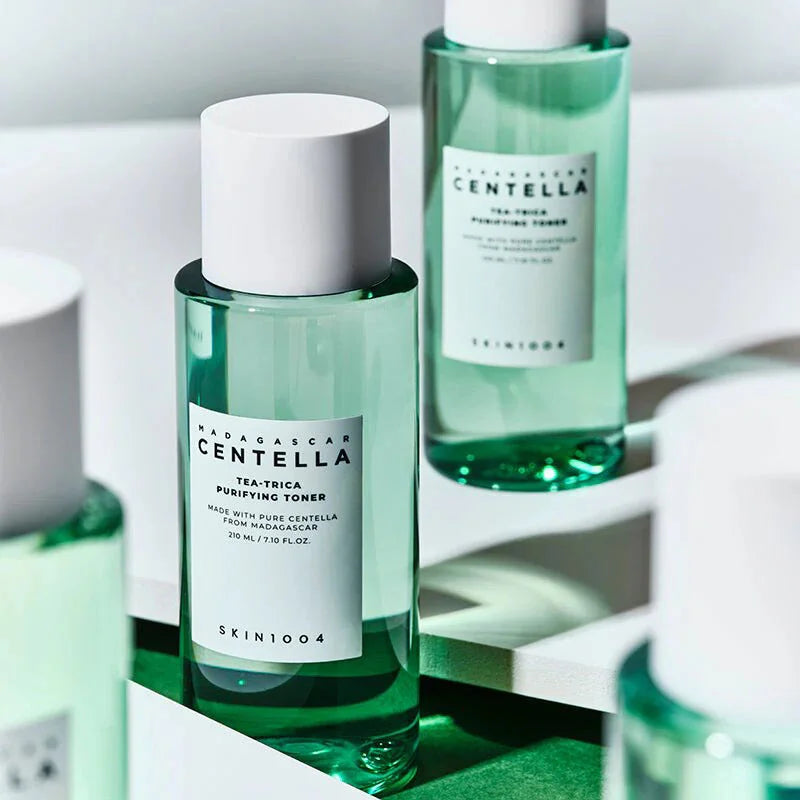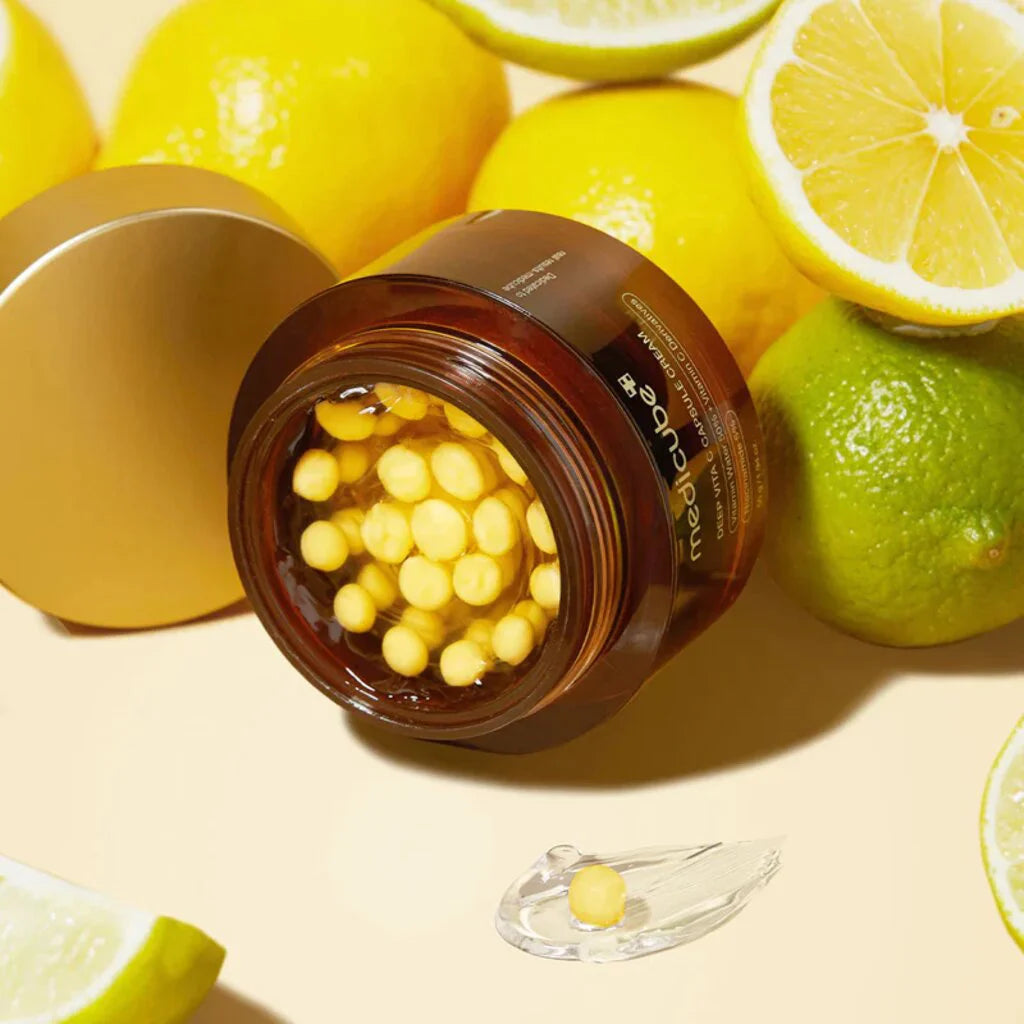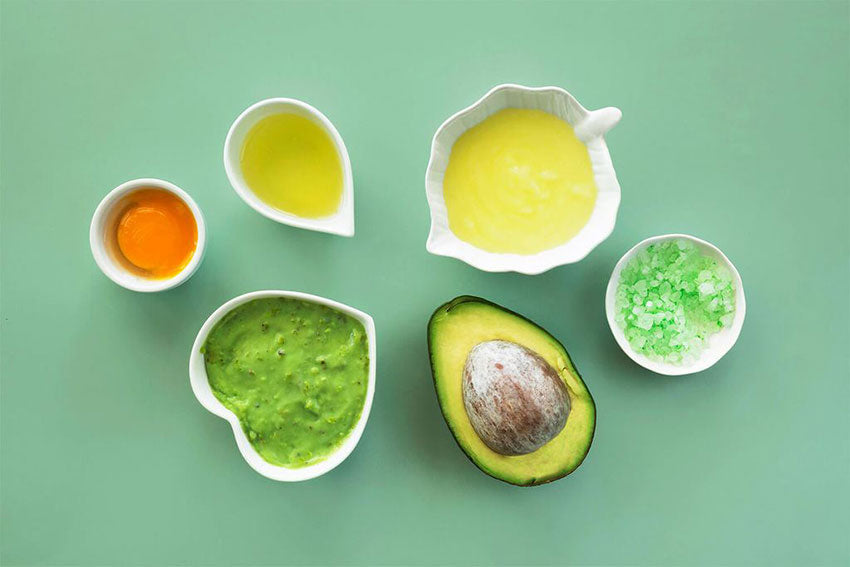Skin Care & Cosmetics Ingredient Glossary (P– R)

Papain
Naturally occurring in the raw fruit of the papaya plant, papain is a protein-degrading (proteolytic) enzyme that helps break down large proteins into smaller pieces, also called peptides and amino acids.
Papaya is high in antioxidants, vitamins, phytochemicals, beta-carotene and chymopapain, which also have antibacterial, antifungal, lightening and exfoliating properties.
This helps to remove damaged keratin so that the product can be better absorbed, inflammation is reduced and the skin can recover from scarring.
Beware, however, that some studies have shown that this enzyme can compromise the skin barrier and cause allergic reactions.
Aromatica Sea Daffodil Cleansing Mousse is a Korean skincare product with papain.
*Syn: Papaya Proteinase
Parabens
Parabens (P-hydroxybenzoic acid - PHBA) are the most widely used preservatives in cosmetics, body and personal care products, and pharmaceutical products.
They help prevent the growth of harmful bacteria, fungi and other microbes, extending the shelf life of products, especially in moist, warm places like the bathroom.
Parabens are controversial ingredients - including variants such as methylparaben, ethylparaben, propylparaben, butylparaben and isobutylparaben. They are accused of containing a weak estrogen-like property that can lead to health risks.
However, some of the research on this topic relates to high concentrations (up to 100%), whereas 1% or less parabens are common in cosmetic formulations.
For those who are not comfortable to use products containing parabens, alternatives such as essential oils, phenoxyethanol, ethylhexyl glycerin, sodium benzoate, potassium sorbate, benzyl alcohol or benzoic acid can be used.
They may have some drawbacks, however - some are effective against fungus and yeast but have problems with bacteria, others are more likely to cause skin irritation or are simply more expensive.
Another option is to use airless pump bottles, which prevent the product from being overexposed to air, extending shelf life.
Phthalate
Phthalates are made from phthalic acid (benzenedicarboxylic acid) and are used as softener, solvents, or fragrances in many beauty and personal care products, such as moisturizing lotions, color makeup, perfumes, nail polishes, shampoos, hair sprays, body washes, and soaps.
Phthalates, however, have attracted much attention because of their potential as endocrine (or hormone) disrupting chemicals - also known as EDCs.
What are EDCs? Endocrine disruptors, when ingested by the body, can mimic or disrupt the body's metabolism and hormones. They are found in many everyday products such as plastic bottles, toys, and even food.
Thankfully, many brands have made their formulas ‘phthalate-free’, but be aware that phthalates can be known by many different names, such as phthalate (DEP), n-butyl phthalate (DBP), dimethyl phthalate (DMP), di-2-ethyl-hexyl phthalate (DEHP), diisobutyl phthalate (DiBP), phthalate esters, fragrances, and more.
Peppermint oil
An essential oil derived from a hybrid plant of watermint and spearmint, peppermint oil is typically used in aromatherapy, toothpastes, mouthwashes, as well as cosmetics.
Peppermint is well-known to relieve upset stomachs and tension headaches, but in cosmetics it can soothe dryness or irritation and cleanse the skin due to its antiseptic and antibacterial properties.
Although essential oils are generally safe in small amounts, they can cause allergic reactions or sensitizing effects on the skin.
*Syn: Mentha Piperita
Pomegranate Fruit Extract
Pomegranate is a great source of antioxidants, vitamins B and C, ellagic acid and anthocyanins, which help detoxify the skin, replenish dry and dull skin and balance the skin's moisture content.
*Syn: Punica Granatum
Prickly Pear Seed Oil
Prickly Pear Seed Oil is a carrier oil with extremely high levels of natural, high-potency antioxidants and essential fatty acids that moisturize and soften the skin, and prevent premature wrinkling and skin damage caused by free radicals and UV rays.
Cactus seed oil contains tremendous amounts of vitamins E and K, which helps lighten hyperpigmentation and under-eye dark circles, promote cell regeneration and increase moisture retention.
It also has anti-inflammatory and antibacterial properties that speed wound healing and reduce redness and irritation.
Huxley skincare uses sustainably farmed, certified organic prickly pear seed oil in their entire beauty line, such as in the Anti-Gravity Cream, Secret of Sahara Grab Water Essence.
*Syn: Barbary Fig Seed Oil, Opuntia Ficus Indica, Indian fig oil
Phytosterols
Phytosterols are plant-derived compounds that are similar in structure and function to cholesterol in that they bind water and make the skin look healthier and plumper.
Phytosterols can be divided into plant sterols and plant stanols, which shield the skin from sun damage, environmental stressors and moisture loss.
We cannot synthesize phytosterols, but they can be found in various dietary sources of plant origin, such as vegetable oils (canola, safflower, sesame, soybeans), nuts and seeds (pumpkin, cashew, peanut), cereals, and legumes.
Pumpkin Seed Oil and Extract
Rich in antioxidants, vitamin E, minerals, omega-3 and 6 fatty acids, pumpkin seed oil helps smooth the appearance of fine lines and wrinkles and protects skin from environmental stressors by neutralizing free radicals.
Pumpkin seeds also contain zinc, which has anti-inflammatory, antiseptic and astringent properties that may be beneficial for oily skin types, especially those with inflammatory acne and associated scarring.
*Syn: Cucurbita Pepo
Peptides
Peptides are short strings of amino acids that are building blocks of proteins found in our bodies. Peptides act as messengers in our bodies to promote collagen production, reduce the appearance of fine lines and wrinkles, and improve elasticity and firmness.
For maximum results, it is better to use peptides in conjunction with skin brightening or antioxidant-rich ingredients that are great for anti-aging effects.
Check out Cosrx Advanced Snail Peptide Eye Cream and Pyunkang Yul Black Tea Time Reverse Eye Cream.
*Syn: Tetrapeptides, Hexapeptides, Argireline
( Recommend blog post: 10 Best Korean Anti-Aging Skincare Products (for 30’s) )
Probiotics
Probiotics are live bacteria and yeasts that help balance our microbiome and improve our immune system and overall skin health.
The more good bacteria we have in our bodies, the more they act as a shield against bad bacteria - which can help prevent and treat skin conditions such as dry skin, acne, eczema, premature aging, unbalanced skin pH and UV-related skin damage.
Missha Time Revolution Night Repair Probio Ampoule, it's a Korean beauty product with probiotics.
*Syn: Bifidobacterium, Lactobacillu, Vitreoscill, Bacillus Coagulans
Propolis
Propolis, also known as bee glue, is a resinous mixture produced by honeybees made up of tree buds, beeswax, saliva, flower sap and other compounds to build their hives. Bee propolis is known for its healing, antibacterial, anti-fungal and anti-inflammatory properties.
Propolis can help control oil production, soothe acne-prone skin, redness and sensitive skin. It also helps protect the skin from free radicals and hydrates the skin without leaving a heavy residue, leaving the skin smoother and softer.
For propolis products, you'll love Benton Aloe Propolis Soothing Gel and Cosrx Ultimate Moisturizing Honey Overnight Mask.
Resveratrol
Resveratrol is a naturally occurring potent antioxidant and a type of polyphenol found in grapes, berries (such as cranberries, blueberries and mulberries), peanuts, pistachios and dark chocolate.
Resveratrol has been shown to fight free radicals, fungal infections, UV radiation, signs of aging and inflammation. It has a rejuvenating power and improves uneven skin tone, rough texture, fine lines, wrinkles, hyperpigmentation, dryness, and radiance.
Retinoids
Retinoids are an umbrella term for any synthetic vitamin A, and retinol is one of many different types of retinoids. Retinoids help improve cell turnover and collagen production, reduce the appearance of wrinkles, dark spots and acne scars, minimize enlarged pores and refine skin texture.
When using a retinoid-based product, you may experience dryness, flaky skin, irritation and acne breakouts for a few weeks during the purge phase - this is your skin's reaction to a specific ingredient that triggers cell turnover.
It's best to opt for your nighttime skincare routine and apply moisturizer and sunscreen the next morning, and avoid using retinoids and AHA at the same time, as this can irritate your skin or cause negative reactions.
*Syn: Retinoid, Tretinoin, Tazarotene, Retinyl Palmitate, Retinaldehyde, Adapalene
Rosehip Seed Oil
Rosehip seed oil, derived from the seeds of rose bushes, is prized for its hydrating, healing and anti-aging properties. It helps moisturize, repair damaged skin and protect skin from daily oxidative stress.
Rosehip oil contains an abundance of vitamins A and C, antioxidants and essential fatty acids (omega-3 linoleic acid and omega-6 linoleic acid) that support cell regeneration, boost overall radiance and firm the skin.
Because of its antibacterial, anti-inflammatory and antimicrobial properties, it may be helpful for acne, rosacea, eczema and other inflammatory skin conditions.
Our picks: Aromatica Organic Rosehip Oil, Olivarrier Wash All Barrier Relief, and Urang Vitamin Oil Serum.
*Syn: Rose Canina
Rose Flower Oil and Water
Rose oil and water are powerful anti-inflammatory, antibacterial agents that help reduce redness, inflammation and aid in killing off acne-causing bacteria and preventing future breakouts.
Rose water and oil also contains antioxidants, vitamin C, phenolics that provide anti-aging and fragrant benefits.
Our picks: Urang Rose Ceramide Cream, Heimish Bulgarian Rose Water Hydrogel Eye Patch.
*Syn: Rosa Damascena, Damask Rose
Rosemary Leaf Extract
Rosemary leaf extract contains rosmarinic acid - a powerful antioxidant that helps prevent skin damage and signs of premature aging by neutralizing free radicals.
Rich in calcium, minerals, magnesium, iron, manganese, phosphorus, potassium, zinc and vitamins that support collagen production and help skin look firmer and more elastic.
This botanical ingredient also has anti-inflammatory, antibacterial, astringent and toning properties that may be useful in combating many skin conditions such as acne, eczema, psoriasis and dermatitis.
Please note that rosemary extract is different from rosemary oil, which contains a higher concentration of fragrances that may cause allergies or irritation.
*Syn: Rosmarius Officinalis





Dejar un comentario
Este sitio está protegido por hCaptcha y se aplican la Política de privacidad de hCaptcha y los Términos del servicio.